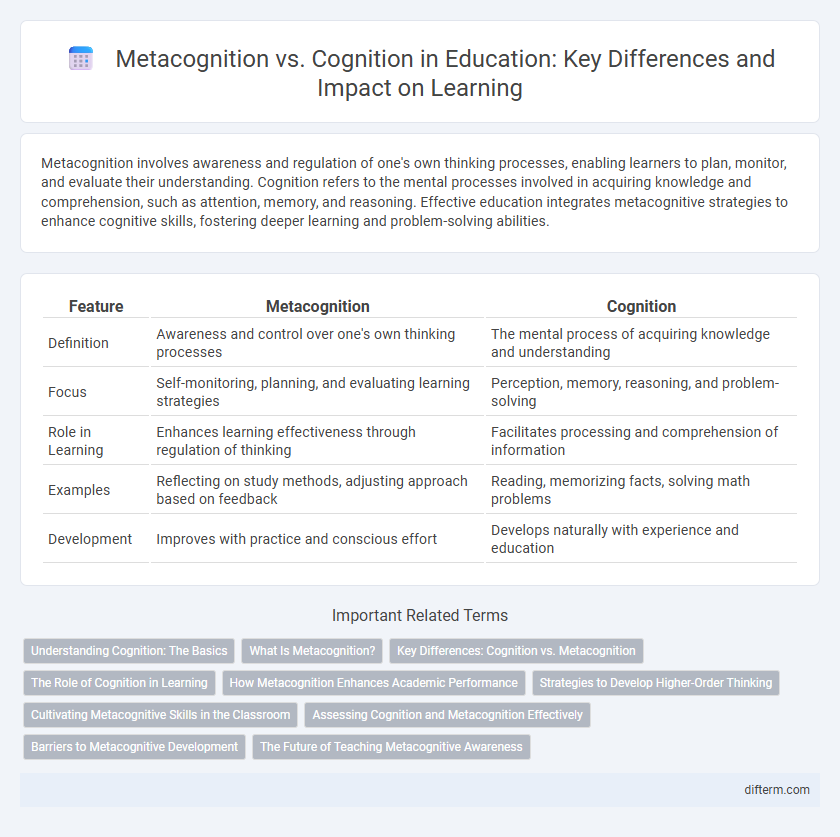Metacognition involves awareness and regulation of one's own thinking processes, enabling learners to plan, monitor, and evaluate their understanding. Cognition refers to the mental processes involved in acquiring knowledge and comprehension, such as attention, memory, and reasoning. Effective education integrates metacognitive strategies to enhance cognitive skills, fostering deeper learning and problem-solving abilities.
Table of Comparison
| Feature | Metacognition | Cognition |
|---|---|---|
| Definition | Awareness and control over one's own thinking processes | The mental process of acquiring knowledge and understanding |
| Focus | Self-monitoring, planning, and evaluating learning strategies | Perception, memory, reasoning, and problem-solving |
| Role in Learning | Enhances learning effectiveness through regulation of thinking | Facilitates processing and comprehension of information |
| Examples | Reflecting on study methods, adjusting approach based on feedback | Reading, memorizing facts, solving math problems |
| Development | Improves with practice and conscious effort | Develops naturally with experience and education |
Understanding Cognition: The Basics
Cognition involves the mental processes of acquiring knowledge and understanding through thought, experience, and the senses. Metacognition refers to the awareness and regulation of one's own cognitive processes, enabling individuals to plan, monitor, and evaluate their learning strategies. Understanding cognition lays the foundation for effective metacognitive skills, which enhance problem-solving and critical thinking in educational settings.
What Is Metacognition?
Metacognition refers to the awareness and regulation of one's own thinking processes, encompassing skills like planning, monitoring, and evaluating learning strategies. Unlike cognition, which involves the actual processing of information, metacognition is about understanding and controlling how that information is processed. Effective metacognitive practices improve problem-solving abilities and enhance academic performance by enabling learners to adapt strategies based on their self-assessment.
Key Differences: Cognition vs. Metacognition
Cognition involves the mental processes of acquiring knowledge and understanding through thought, experience, and the senses, including perception, memory, and problem-solving. Metacognition refers to the awareness and control of one's own cognitive processes, enabling individuals to plan, monitor, and evaluate their learning strategies effectively. Key differences highlight that cognition is about processing information, while metacognition focuses on regulating and reflecting on that cognitive activity to improve learning outcomes.
The Role of Cognition in Learning
Cognition plays a fundamental role in learning by enabling the processing, storage, and retrieval of information through mental activities such as perception, attention, memory, and reasoning. Effective cognitive strategies enhance learners' ability to understand and apply new knowledge, supporting problem-solving and critical thinking skills essential for academic success. Metacognition, involving awareness and regulation of one's cognitive processes, further optimizes learning by allowing students to plan, monitor, and evaluate their understanding and performance.
How Metacognition Enhances Academic Performance
Metacognition, the awareness and regulation of one's own learning processes, significantly enhances academic performance by enabling students to plan, monitor, and evaluate their understanding and strategies. This self-regulatory skill promotes deeper comprehension and more effective problem-solving compared to cognition alone, which involves basic processing of information. Research indicates that students skilled in metacognition demonstrate higher retention rates and adaptability in complex academic tasks, leading to improved grades and lifelong learning abilities.
Strategies to Develop Higher-Order Thinking
Metacognition involves awareness and regulation of one's own thinking processes, enhancing higher-order thinking skills through strategies like self-questioning, reflection, and monitoring comprehension. Cognition refers to basic mental processes such as memory and attention, which are foundational but less focused on self-regulation. Developing metacognitive strategies empowers learners to plan, evaluate, and adjust their learning approaches, fostering critical thinking, problem-solving, and analytical skills in educational settings.
Cultivating Metacognitive Skills in the Classroom
Cultivating metacognitive skills in the classroom enhances students' ability to monitor and regulate their own learning processes, leading to improved problem-solving and critical thinking. Teachers can implement strategies such as self-questioning, reflective journaling, and think-aloud protocols to foster students' awareness of their cognitive strategies and learning goals. Emphasizing metacognition alongside traditional cognition promotes deeper understanding and long-term retention of educational material.
Assessing Cognition and Metacognition Effectively
Assessing cognition involves measuring a learner's ability to acquire, process, and apply information, typically through standardized tests and performance tasks. Metacognition assessment focuses on evaluating awareness and regulation of one's own cognitive processes, often using self-report questionnaires and reflective journals. Combining both approaches provides comprehensive insights into learning effectiveness and guides targeted instructional strategies.
Barriers to Metacognitive Development
Barriers to metacognitive development include limited self-awareness, inadequate instruction on reflective strategies, and fixed mindsets that hinder self-regulation. Students often struggle with recognizing their cognitive processes, resulting in difficulties applying effective learning strategies. Overcoming these obstacles requires targeted interventions that promote metacognitive skills, such as guided reflection and explicit teaching of monitoring techniques.
The Future of Teaching Metacognitive Awareness
Metacognitive awareness promotes self-regulated learning by enabling students to evaluate and adjust their cognitive processes, enhancing problem-solving and critical thinking skills. Integrating metacognitive strategies into curriculums advances personalized learning, fostering adaptability in rapidly evolving educational landscapes. Future teaching models must emphasize metacognition to empower learners with effective tools for lifelong knowledge acquisition and innovation.
metacognition vs cognition Infographic

 difterm.com
difterm.com